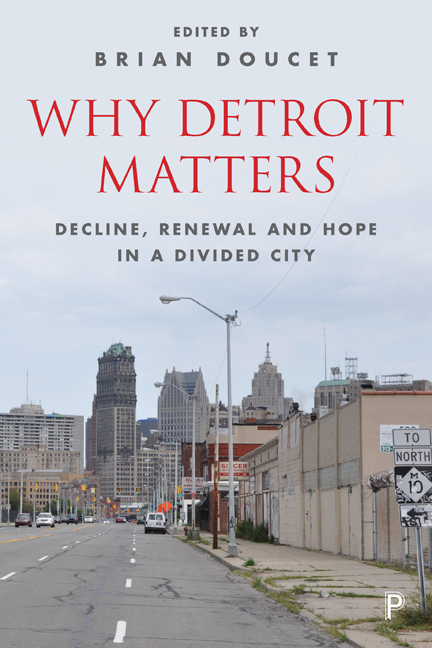Book contents
- Frontmatter
- Contents
- List of contributors
- List of figures and tables
- Acknowledgments
- one Introduction: why Detroit matters
- Section One Lessons from Detroit
- Intermezzo I You may not know my Detroit
- Section Two Practices from Detroit
- Intermezzo II My Detroit
- Section Three Conversations from Detroit
- References
- Index
seventeen - Detroit Coalition Against Police Brutality
Published online by Cambridge University Press: 05 April 2022
- Frontmatter
- Contents
- List of contributors
- List of figures and tables
- Acknowledgments
- one Introduction: why Detroit matters
- Section One Lessons from Detroit
- Intermezzo I You may not know my Detroit
- Section Two Practices from Detroit
- Intermezzo II My Detroit
- Section Three Conversations from Detroit
- References
- Index
Summary
The Detroit Coalition Against Police Brutality is one of America's first and leading organizations fighting police brutality. The Coalition was founded by educator/activist Gloria House, PhD, and Marge Parsons in 1996, and was led from the late 1990s on by Ron Scott, who passed away in November 2015. Detroit has a long history with police brutality, as Sandra Hines discusses using her own personal experiences.
After the city's 1967 Rebellion, precipitated by consistent and pernicious police brutality against African-Americans, Detroit moved quickly to become a predominantly African-American city. Yet, the police force remained dominated by whites. In 1971, the Detroit Police Department created the anti-crime taskforce Stop the Robberies Enjoy Safe Streets (STRESS). In two years, the STRESS unit was involved in the deaths of more than 30 individuals, predominately African-Americans. Ending the STRESS program was one of the campaign promises of Coleman Young, who was elected as the city's first African-American mayor in 1973. While Young worked to integrate the police department, the continuing economic decline of the city meant that major problems remained. As Sandra Hines describes, the immediate impetus for founding the Coalition grew out of the police killing of Malice Green in November 1992, six months after the uprisings in Los Angeles against the acquittal of the police involved in the Rodney King beatings (see Azikiwe, 2006).
Since its founding, the Coalition has been active with the Detroit Board of Police Commissioners, which provides civilian oversight of the police department, by attending its regular meetings and bringing issues and incidents of police brutality to the Board. In Scott's obituary, it was argued that the Coalition's work and Scott's advocacy were important factors in Detroit avoiding the kind of anti-police brutality uprisings seen in cities such as Ferguson or Baltimore (Fournier and Dickenson, 2015). Sandra Hines has been active in the Coalition for many years and is currently its President. She hosted a radio show with Ron Scott, Fighting for Justice. For more on the Coalition, see: www.detroitcoalition.org
Can you start by describing some of the history of police brutality in Detroit?
The Coalition was born to respond to police control over poor and black people. Historically, instead of living by the dictum “to protect and serve,” the police have been there “to command and control.” Over the years, because of where Detroit was located, many black people came from the South to the North.
- Type
- Chapter
- Information
- Why Detroit MattersDecline, Renewal and Hope in a Divided City, pp. 283 - 288Publisher: Bristol University PressPrint publication year: 2017



